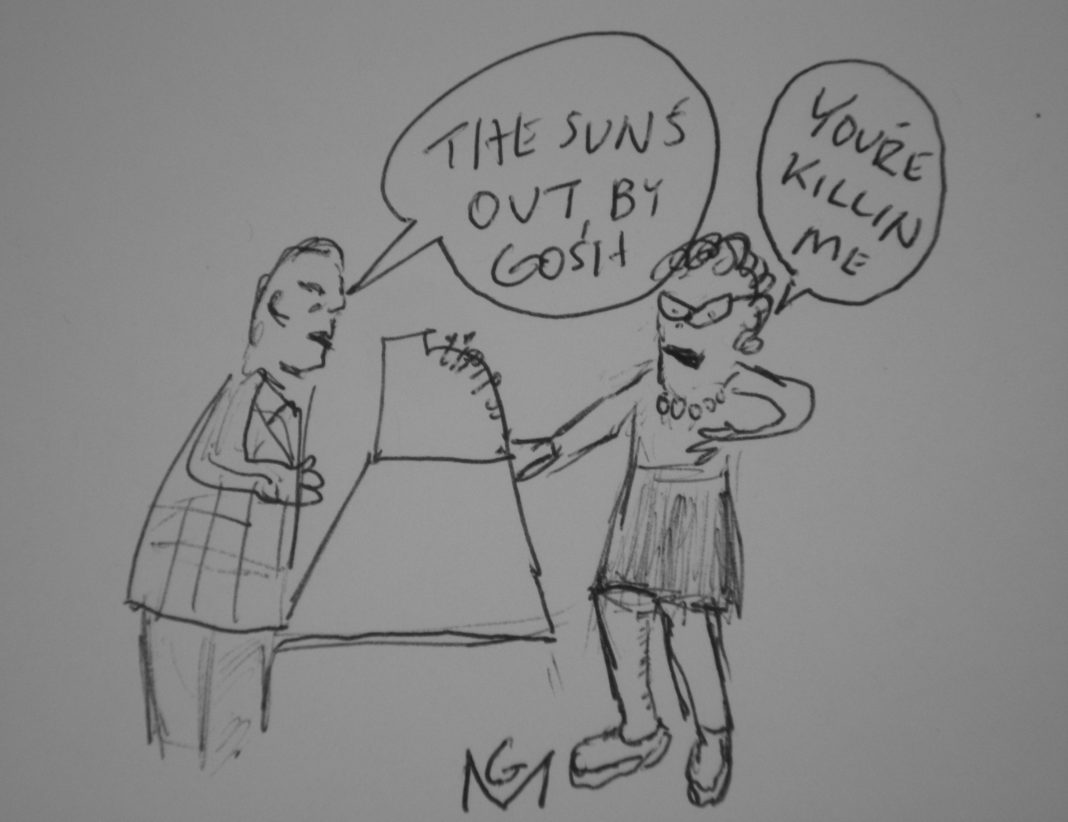UNITED STATES—The drug store was a place where the community manifest itself. People could make any old comment about the weather and it would pass for wit, or they could rib my dad about his shirttail sticking out. That was an enduring, endearing sartorial feature of a man oblivious to the physical details of a shirttail sticking out. Once the Rotary Club, that met met in the banquet room of the Resetar Hotel, gave him a shirt customized with a six-foot-long tail so it would stay in. After the shirt produced loads of laughs, my mom sheared off the Gargantuan tail and the shirt joined his wardrobe.
The drug store served as a living cuckoo clock; people came in and out according to a larger and sophisticated clockwork. The burly railroad worker with the Karl Marx beard and bib overalls who overnighted at the hotel. There was spunky white-haired sweet Mrs. Miller with the baseball cap–she was a big baseball fan. She would make bets with my dad, and their betting tastes naturally fell to opposing teams. After Valenzuela started pitching for the Dodgers, she wouldn’t bet on a team with a Mexican pitchers, and this worked in my father’s advantage. There was Mick Carney and his dad, old and blind and dignified, resting a chin on his cane (he’d been in the theater business); the son crazed from Korea but in a very entertaining way, “Oooh, it’s the end of the world,” he’d moan, latching onto a leitmotiv. “The problem is the Monroe doctrine, the Marilyn Monroe doctrine.” It was poetry. There was Tim. My uncle from out of town met him and thought he was a priest or undertaker because of his soft handshake; indeed he was very mild and priestly. A car wreck in the sixties had done something to him; it left him in a marvelous state that would have been the envy of any zen master. Tim had been a commercial artist living in San Francisco, and the great mystery about him was he lived alone and weekly bought huge boxes of toilet paper. I always imagined him living in a house full to the ceiling with toilet paper.
There was Pal who came in on his bicycle rounds, who called my dad boss, me junior; all the girls were sweetheart and my mother momma. Hardly a day went by when the owner emeritus, Al Meyer, didn’t come in from his house on Brewington or his ranch on San Juan Road, to check up on the old place and he was quite entertained by dad’s flailing arm business, which I will relate in due time. Every Christmas Meyer gave us boxes of canned Cara Mia artichoke hearts from his ranch, and they rotted in our garage. These pickled artichoke hearts were food for adults and the adults in my family didn’t know what to do with them.
All I say is if you’re crazy you had a better chance of being remembered in Watsonville. Pete Sapro, the eminently sane and yet high-strung accountant, would come in every afternoon with his gray worsted suit and tie loosened at the neck, and on the balls of his feet her would survey the whole rack of candy bars and you’d know that he put some real thought into his choice, whether it was a Rocky Road or a Butterfinger.
An integral part of the Johnson Drug team was the delivery boy, who was usually an archetypal teen. There were a lot of them, over the decades they branched out into women and the middle aged who got to drive the delivery car. One was a ratty Toyota wagon that got to be my first car; twice it got hot-wired from in front of our garage and then recovered. For sure the coolest car was a white teardrop Subaru with suicide doors–it was a total novelty car. The delivery boys loved it and the big novelty was that six feet two inches of dad could get behind the wheel of it. The doors got painted with Rx on the side and it was a real signature for the store puttering around town with its tiny two-stroke engine.
Even if the store didn’t bear the name Miller, the signature delivery car, that cost all of $ 900 new, embodied the Miller era of Johnson Drug.
To be continued…






